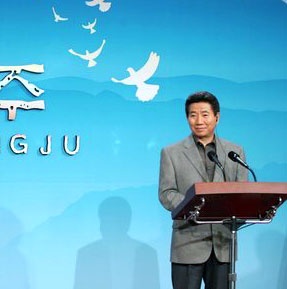Roh Moo Hyun
president of South Korea
born August 6, 1946, Gimhae, near Pusan, Korea 【now in South Korea】
 South Korean politician and lawyer, president of South Korea from 2003 to 2008.
South Korean politician and lawyer, president of South Korea from 2003 to 2008.Born into a poor family, Roh worked as a night watchman in high school and later served in the military (1968–71). Although he did not attend college, he was able to pass the bar exam in 1975. He was appointed a judge in 1977 and later became a highly respected human rights lawyer, defending student protestors accused of being pro-communist.
In the late 1980s, Roh entered politics at the invitation of then-opposition leader Kim Young Sam. Roh won a seat in the National Assembly in 1988 and gained notice for criticizing the military regime of President Chun Doo Hwan. In 1990 he split with his party when Kim made an alliance with general-turned-president Roh Tae Woo. That alliance led to Kim's election as president, and Roh Moo Hyun's political fortunes seemed to crumble. He lost his seat in the National Assembly in 1992 and failed to regain it in 1996. He also lost a bid to become mayor of Pusan in 1995. Nevertheless, Roh continued to favour democratic reforms and refused to compromise with the pro-military party. He eventually led a small opposition party into an alliance with Kim Dae Jung, and when Kim came to power in 1998, Roh served in his cabinet.
In 2002 Roh, supported by outgoing president Kim, made a bid for the presidency. Roh favoured negotiating with North Korea rather than isolating it. He preferred using diplomacy in persuading North Korea to abandon its nuclear weapons policy, and he was openly critical of U.S. policy toward the Korean peninsula, a stance that appealed to the growing anti-American sentiment in the country. In December 2002 Roh defeated Lee Hoi Chang in a tightly contested presidential race, receiving 48.9 percent of the vote to Lee's 46.6 percent.
After taking office in February 2003, Roh faced a faltering economy and labour unrest. He also found himself in the midst of a financial scandal after several of his aides were accused of accepting illegal campaign donations. In October 2003 Roh called for a national vote of confidence, but parliament opposed the referendum, which was not provided for in South Korea's constitution. Allegations of election law violations and economic mismanagement soon followed, and in March 2004 Roh was impeached by parliament, a move that was highly unpopular with the public. Forced to temporarily step down, he was reinstated as president in May after the Constitutional Court overturned the impeachment. Under the shadow of scandal for most of his term, Roh was unable to take advantage of the parliamentary majority that his party achieved in late 2004. Continuing economic malaise in South Korea caused his poll numbers to drop to the single digits, and a North Korean nuclear test in 2006 was seen as a sign of failure for the soft diplomacy championed by Roh and his predecessor. While Roh was unable to run for a second term because of South Korean election law, in December 2007 his chosen successor, Chung Dong-young, was soundly defeated by Grand National Party candidate Lee Myung-bak.
- Vladimir Golubnichy
- Vladimir Horowitz
- Funk & Wagnalls dictionaries
- Funk, Walther
- funnel weaver
- funnel-web spider
- Fur
- fur
- furan
- Furbish, Catherine
- Furchgott, Robert F.
- Furetière, Antoine
- Furies
- Fur languages
- furlong
- Furman University
- furnace
- Furnariidae
- Furneaux Group
- Furneaux, Tobias
- Furness
- Furness, Frank Heyling
- Furness, Horace Howard
- Furniss, Harry
- furniture